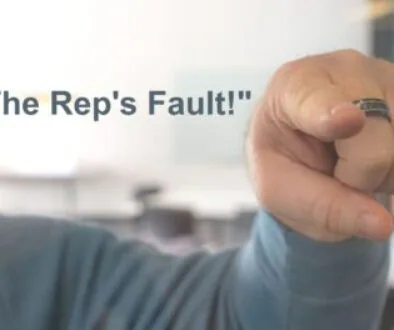You Can’t Be A Medical Sales Professional and a Schmuck
Late one afternoon last week I answered my office phone. A woman said, “Hello. Can I please speak to the owner?” An opening like tells me that I will soon be hanging up on an annoying telephone solicitor. I always make an effort to be polite, but I value my time and unprepared, unprofessional salespeople test my patience. On the other hand, I’ve learned that weathering an occasional unwelcomed sales pitch provides content for my presentations and articles.
We’re only five seconds into the phone call, but I’m already irritated. This is the 21st century. This is the age of limitless data and information. If you’re calling a business and want to speak to the owner, why don’t you know the owner’s name?
I didn’t want to jump to conclusions. Maybe she did know my name. After all, if you’re calling Sales Pilot Medical Sales Performance and you do an online search, the name Mace Horoff is all over the place. So, I provided her an opportunity for redemption by asking, “Which owner?”
She immediately had the answer. “The owner of the business.” I knew now that I was dealing with a pro, or at least someone who was a fast thinker. She didn’t want the owner of the building or the owner of the telephone. She wanted the owner of the business. With such a clear mindset, she must know the owner’s name, right? So I offered one more chance.
“There’s more than one owner. Which one do you want to speak with?”
Her next response told me that I was dealing with President’s Club material. She didn’t hesitate.
“Whichever one is there.”
I may have felt a nanosecond of admiration for her persistence (although I doubt it), but I was about out of patience. Instead of just hanging up the phone, I tried to offer some unpaid consulting (which is never a good idea).
“Miss, if you can tell me the name of the owner you would like to speak with, I can help you.”
She replied with reduced energy in her voice. “I don’t have that information.”
I asked one last question. “Why not?” She answered the question by hanging up. The telephone solicitor hung up on me. That’s a switch!
This Would Never Happen in Healthcare, Right?
When she hung up on me, I actually smiled, happy in the fact that the market for sales and customer service training is strong for my colleagues who don’t specialize in healthcare as I do. But this doesn’t help me. Surely, there are no medical sales reps who would call or visit a doctor’s office, hospital, or clinic without having the right information prior to the call, right?
Did you sense a note of sarcasm in my last sentence?
There is a word the Jewish people use to describe sales representatives who think they can approach a time-challenged, disinterested professional such as a doctor, department head, or hospital executive without adequate research.
The word is schmuck. It’s not a compliment.
[themify_quote] You can’t be a medical sales professional and a schmuck at the same time. [/themify_quote]
One of the biggest challenges medical sales reps report is reduced access to doctors and other healthcare decision-makers. Why is this?
There are many reasons. Sometimes decision-makers don’t control salesperson access. For example, a hospital may control rep access to the institution and divert salespeople to Purchasing instead of a clinical department.
And then there are clinicians who need to see more patients to offset declining reimbursement. In their minds, allowing salespeople into their schedule offers little more than wasted time…especially when those salespeople show up unprepared.
Busy medical professionals and healthcare executives have little patience for salespeople who ask questions about information the salesperson should already know. Questions such as, “Do you do dialysis here” or “What types of surgeries do you perform” show that you haven’t done your homework.
Yes, you need to ask questions—good questions that get prospects to focus on elements of their practice or business they overlook or don’t recognize so you can position needed solutions. Too often though, salespeople waste healthcare providers’ time to ask questions that can be answered by staff or an internet search.
Sitting in a doctor’s waiting room for most people is boring agony. For me, it’s pure entertainment (save for the occasional inconsiderate moron who coughs on me). I love observing medical and pharmaceutical sales reps as they approach the receptionist’s window. I can’t tell you how often I hear, “Are any of the doctors available to see me?” The receptionist almost always responds, “Who did you want to see?” That’s when the iPad comes into view and the sales rep hesitantly reads off a list of names.
I want to cheer them on and shout, “Great value proposition. You go guy…” but I just smirk and try not to shake my head visibly. I mean, that’s just wrong. A sales professional should know who is in which office on what day. And they should present a compelling value proposition to justify the doctor’s valuable time. Or…
…they can be like the phone solicitor who calls and says, “Can I speak to the owner?”
Remember the not-so-nice-sounding word I shared with you a moment ago to describe such a person? Don’t be one! Do your research before making contact, or don’t even bother.




@ 3:11 pm
Is “schmuck” a little too harsh, or is it appropriate? What do you think about medical sales reps who approach with a can-I-please-speak-to-the-owner attitude?
@ 9:28 pm
Hi Mace!
In our market (Physical Therapy / Rehab / Chiro) I want to speak with the person that does the supply/equipment ordering. It’s not always the owner of the clinic, and that person’s name is not always easy to find online. Whether on the phone or in-person, I never want to rule out that the person I am speaking with does the ordering, so I say something like “In addition to yourself, who is responsible for saving money on supplies and equipment?” Do you think this is a good approach, or do you have another suggestion?